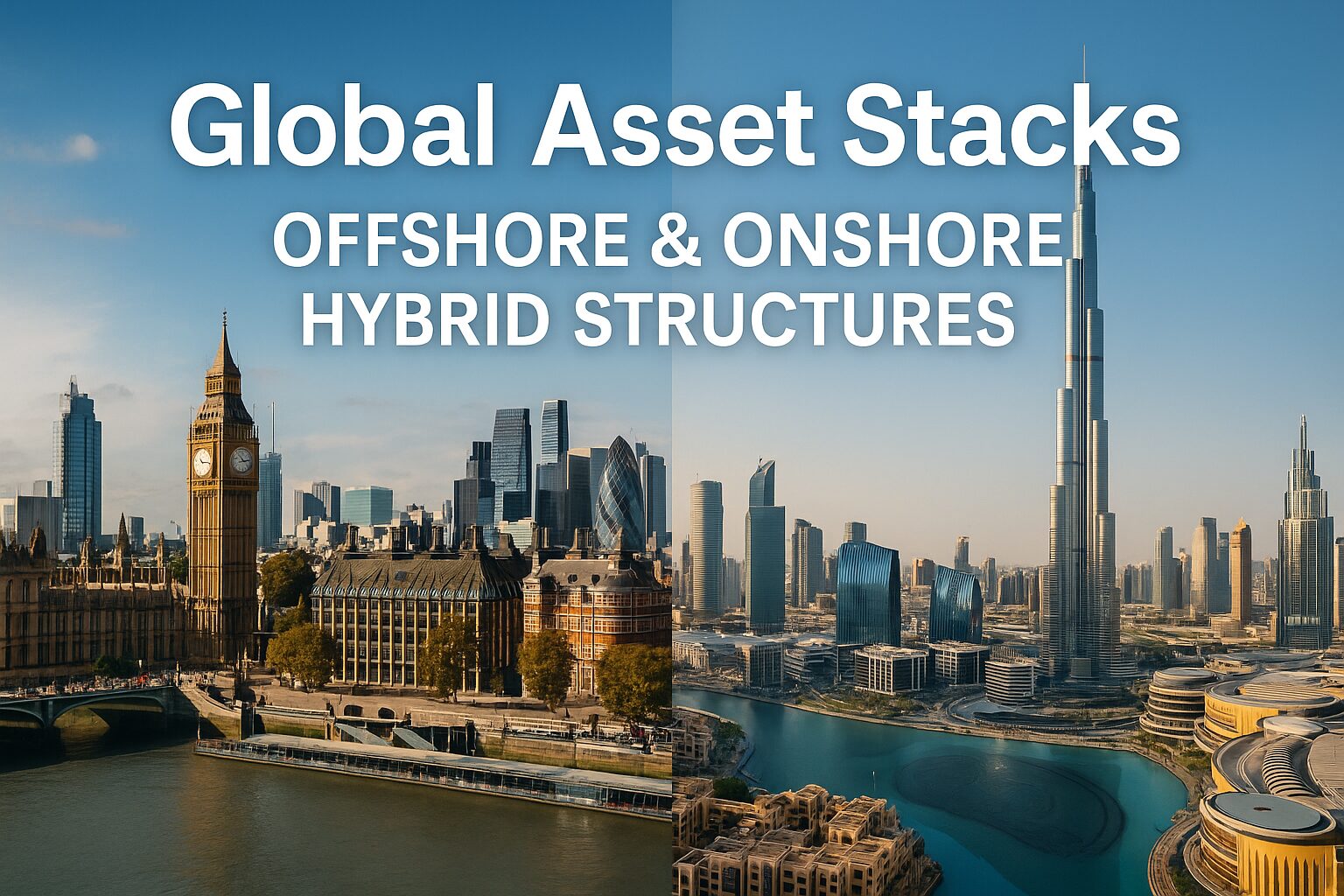Multi-currency and multi-account systems are the first real step toward global wealth. But as your wealth grows, you quickly face new challenges: tax burdens, asset protection, inheritance planning, and political risk. Having multiple currencies is useful, but it does not solve everything. A government can still impose taxes, creditors can still sue, and wealth can still be frozen or seized.
This is where global elites move to the next level: hybrid structures. Instead of choosing either offshore or onshore, they combine both. Offshore companies give tax efficiency and privacy. Onshore entities provide legitimacy and access to banking. Together, they form a powerful shield for wealth — flexible, legal, and global.
In this article, you will learn how offshore and onshore entities work, how billionaires combine them, and how you can strategically build your own hybrid wealth structure.
Main Body
Section 1 — Understanding Offshore Structures
What is Offshore?
Offshore simply means “outside your home jurisdiction.” It does not mean illegal. Offshore companies, trusts, and foundations are legal vehicles recognized under international law.
Popular Offshore Jurisdictions:
- British Virgin Islands (BVI): Flexible, low reporting requirements, widely used for holding companies.
- Cayman Islands: Hedge fund hub, no corporate tax.
- Seychelles / Belize: Cheaper, fast incorporation.
- Isle of Man / Jersey / Guernsey: Trusted for trusts and insurance wrappers.
Advantages:
- No/low corporate tax.
- Privacy for ownership.
- Easy to move capital across borders.
Limitations:
- Harder to open bank accounts without onshore presence.
- Increased scrutiny from regulators and FATF (Financial Action Task Force).
Section 2 — Onshore Entities and Their Role
Onshore means operating within reputable, regulated jurisdictions. These entities are often not zero-tax, but they provide credibility and legitimacy.
Examples:
- UAE Free Zone Companies (Dubai, Abu Dhabi, Ras Al Khaimah): 0% corporate tax in many zones, strategic global banking hub.
- UK LLPs (Limited Liability Partnerships): Transparent structure, can be tax-neutral if operated outside UK.
- Singapore Pte Ltd: Prestigious, easy access to Asian banks, competitive tax (17% headline, often much lower with exemptions).
- Hong Kong Limited: Gateway to China, efficient for trade and finance.
Advantages:
- Respectable jurisdictions, fewer “red flags.”
- Easier to open bank accounts.
- Access to double taxation treaties.
Limitations:
- Requires more accounting/reporting.
- Subject to substance requirements (real office, directors).
Section 3 — The Power of Hybrid Structures
The wealthy do not choose offshore or onshore. They combine them:
- Onshore + Offshore Holding:
- Example: A Singapore Pte Ltd owned by a BVI company. The Singapore entity runs operations, while the BVI entity holds shares. This structure reduces taxes while adding privacy.
- Trust + Company Combination:
- Example: A Jersey trust holds shares in a Cayman company. The trust provides inheritance planning, while the company runs investments.
- Foundation + Bank Accounts:
- Example: A Liechtenstein foundation holding multiple accounts in Europe, UAE, and Asia. Provides asset protection + succession planning.
Why Hybrid Wins:
- Offshore alone = suspicious.
- Onshore alone = high tax, limited privacy.
- Hybrid = the best of both worlds.
Section 4 — Practical Steps to Build Your Own Hybrid
- Assess Your Needs:
- If income < $1M/year → Start with one onshore entity + offshore holding.
- If income > $5M/year → Add trusts or foundations.
- Jurisdiction Selection:
- Asia-focused? → Singapore + BVI.
- Europe-focused? → UK LLP + Jersey trust.
- Global mobility? → UAE Free Zone + Cayman.
- Banking Strategy:
- Always link your structure to reputable banks. HSBC, DBS, Emirates NBD, Swiss banks are ideal.
- Avoid small Caribbean banks with no reputation.
- Compliance:
- Always stay legal. Declare entities if required.
- Use international tax treaties to optimize legally.
Conclusion
Hybrid structures are not about hiding wealth. They are about protecting wealth, minimizing risk, and optimizing taxes legally.
By combining offshore flexibility with onshore legitimacy, you create a structure that is both respected and efficient. This is why billionaires use UAE Free Zones, UK LLPs, Singapore companies, and offshore trusts — because no single jurisdiction can provide everything.
If you want to scale from being a high-net-worth individual to an ultra-high-net-worth family, hybrid structures are the turning point.
Case Studies
- Case A — Korean Entrepreneur: Owns an e-commerce brand. Sets up a Singapore Pte Ltd for operations, owned by a BVI holding. Taxes fall dramatically, banking becomes easier, and brand looks more credible.
- Case B — European Investor: Uses a UK LLP for global investments, with profits flowing to a Jersey trust. Gains tax neutrality + inheritance protection.
- Case C — Dubai Expat: Opens a UAE Free Zone company. Links it to accounts in Emirates NBD and HSBC. Pays 0% corporate tax, enjoys credibility, and can expand internationally.
- Case D — American Tech Founder: Creates a Cayman holding company, owned by a Delaware LLC, wrapped in a family trust. Achieves global investment access + estate planning.
Next Article Preview
Part 4 — Real Assets & Digital Assets in One Stack
“Hybrid structures give your wealth legal armor. But protection is not enough — you also need growth. In Part 4, we’ll explore how combining overseas property with digital assets like Bitcoin and tokenized securities can create a balanced, powerful stack of real-world and digital wealth.”
Subscription Call-to-Action
“This series is your ultimate guide to building $80,000+ monthly recurring income through Global Asset Stacks. Subscribe now to receive every blueprint, case study, and checklist — and learn how to protect and multiply your wealth across borders.”
